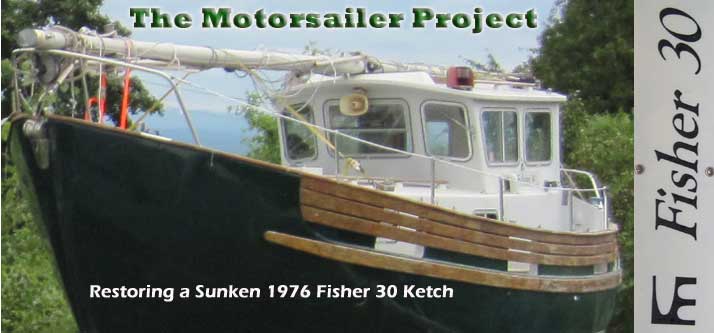Project Log: Friday March 11, 2011
The final tank awaiting installation was the centerline
aft fuel tank, located beneath the cockpit and a virtual
replica of the original tank that I'd removed some
months ago.
Now that the new tank platform and surrounding area was
freshly painted, all that stood in the way of the tank's
final installation was the acquisition of the materials
required to install it firmly in place. I ordered
stainless steel padeyes, bolts, and straps, and with the
materials on hand I proceeded with the installation.
The tank platform itself would hold the tank from
side-to-side on its own, but the tank needed to be
strapped down so it couldn't possibly shift upwards.
To hold the tank in place, I installed two cast
stainless padeyes on each side of the tank platform,
bolted through the sides of the platform to hold them
securely. I'd allowed enough additional width in
the tank platform to accommodate the bolt heads. |
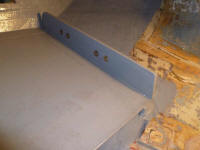
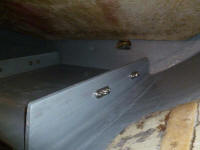
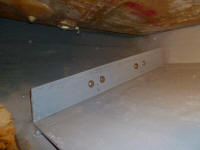
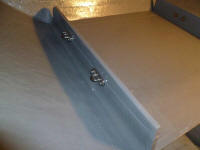 |
It was probably unnecessary, but I decided to install
some dense rubber chafe protectors over the heads of the
bolts on the inside edges of the tank platform. I
thought this would help prevent any potential problems
between the bolts and the sides of the tank; the rubber
also acted as wedges, which ended up holding the tank
snugly--but not overly tight--when I slipped it into
place afterwards.
At the forward end of the tank, I'd earlier prepared a
wooden strip to span the front edge of the tank between
the sides of the base platform, which I installed now to
help hold the tank in place (though it was a friction
fit between the rubber covers on the sides).
Later, I'd add additional support to the forward end to
hold the tank securely; this would come in the form of
the A-shaped brace that would double as a support for
the mizzen mast step above, as seen in photos from the
boat's original layout when she arrived here. For
now, though, the screwed-in wooden strip would be
plenty. |
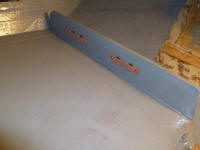
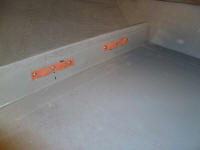
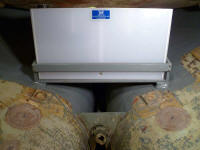 |
I installed a bronze tank drain valve and close nipple,
as with the other tanks in the engine room. |
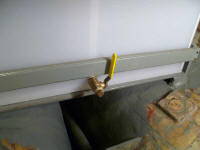 |
To hold the tank securely against the platform, I used a
pair of 3000 lb. ratchet straps. I ordered straps
that were purported to have composite bodies, which I
thought would be a good hedge against corrosion;
unfortunately, only the ratchet handles were composite,
while the main body of the ratchet was steel, as on most
ratchet straps. I decided to use them anyway, and
the straps would be easy to replace later if the bodies
started to rust. I'd probably coat the bodies with
waterproof grease or something to limit their potential
for corrosion, but that would come much later.
To make the straps work effectively, I had to
modify the ratchet end. The length of the strap at
that end was long enough so that the ratchet body and
handle ended up at the top of the tank in awkward and
unusable positions (both the forward and after straps).
To get around this problem, I cut the S-hook off the end
of the strap, leaving a sewn loop only, and cut off the
pin holding the strap to the ratchet body, as there was
no means of undoing the pin as designed. Then, I
replaced the pin with a bolt of appropriate diameter,
and, up in the boat, threaded the strap through the
padeye and then back up to the ratchet body, where I
secured both ends with the new pin. This shortened
the length as needed so that the ratchet bodies and
handles ended up on the side of the tank. |
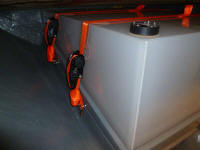
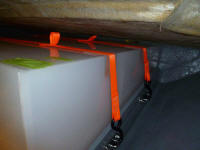
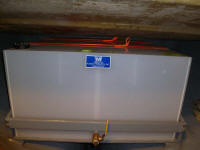 |
Where the straps passed across the top corners of the
tank, I installed dense rubber chafe material beneath. |
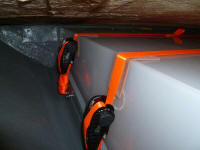 |
This completed, essentially, the installation of the
last tank. As with the other tanks, I covered the
holes for the various fittings with tape to prevent
debris from getting into the tank during the remaining
construction. |
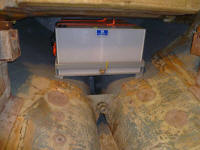 |
Finally, I installed a bronze drain valve on the forward
water tank. On this final tank, I left the bronze
drain plug out of the valve for now, something I should
have done on all the tanks since I planned to fill each
with water as a test at some point, and would need to
drain all the tanks; of course this only clicked in my
mind on the last of six tanks (though of course I could
remove the plugs from the other drain valves when the
time came). |
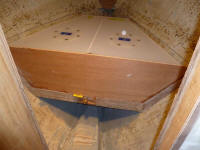
|
Total Time Today: 4.25 hours
|
<
Previous | Next > |
|
|
